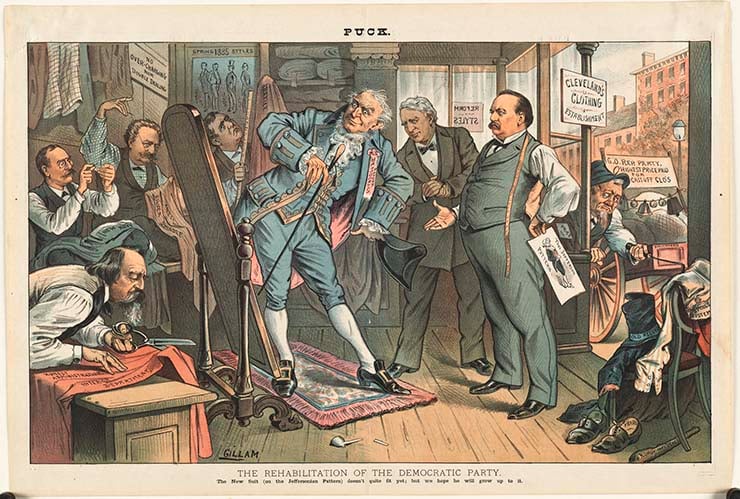In his September 17, 1796 Farewell Address, George Washington delivered a lengthy appraisal of the state of the nation along with recommendations. Many Americans are familiar with his warnings about foreign entanglements, but deserving equal attention, especially in view of the events of the last 20 years or so, are Washington’s caveats about political parties and factions. Here is one of several paragraphs in which he alerted Americans to these dangers:
“However [political parties] may now and then answer popular ends, they are likely in the course of time and things, to become potent engines, by which cunning, ambitious, and unprincipled men will be enabled to subvert the power of the people and to usurp for themselves the reins of government, destroying afterwards the very engines which have lifted them to unjust dominion.”
From the time Washington left office to return to Mount Vernon, political parties have both shaped and influenced America’s domestic and foreign policies. In many instances, the motives of these party members were laudable, to whatever extent they aimed, even if wrongheaded, toward the health and betterment of the country. Not so long ago, for example, liberal members of Congress like Democrats Tip O’Neill and Patrick Moynihan, and Republicans like Nelson Rockefeller, embraced certain causes and programs that aroused opposition, but even their critics generally viewed these men as patriots who revered their country, its ideals and its Constitution.
Today is different. The divisive factions our first president warned against are caused not so much political parties per se—we are long accustomed to a two-party system—but by ideologies, a situation Washington could never have anticipated. A case in point: the tentacles of the Diversity, Equity, and Inclusion (DEI) movement which have gripped our government, universities, and many corporations for the last decade have their origins in critical race theory. The gender theories that have infected our education system and culture at large and the Biden administration’s open borders reflect a similar ideological bent. It is important to note that the proponents of these dogmas show little to no concern for the greater good of the American people and their way of life. Certainly no one would hail these ideologues as exemplars of American patriotism.
Most pundits assert that Donald Trump, his followers, and an often laggard Republican Party claimed victory in November because of voter concerns with inflation, broken borders, and crime. True, but these commentators fail to see that these same voters were aware, however vaguely, that a crew of anti-American doctrinaire leftists associated with the Democratic Party had seized the helm of government and were steering the country toward disaster.
The losers in the November election speak of their failure to communicate effectively with the American people, yet few of them have pointed a finger at the radicals within their own party and their disconnect from what is best for the people they are supposed to serve. To reject that radicalism wholesale requires guts, grit, and gumption, all three of which are missing among most Democratic observers. In addition, these analysts of the lost election remain blind to the fact that many American voters are not fervent believers in “isms” and dogma but just want policies that support the interests of their communities and the nation.
Equally unaware, apparently, of this sea change in the electorate are many of our legislators and bureaucrats. In mid-December the Congress attempted to pass another business-as-usual massive spending bill, ostensibly to keep the government from shutting down but packed with more pork than an Iowa hog farm. Under pressure from president-elect Donald Trump and his Department of Government Efficiency head Elon Musk, the 1,547 page bill was cut down to 118 pages.
At about the same time, Senator Rand Paul and his crew issued this year’s “Festivus Report,” which details the waste behind our staggering national debt and the manner in which Congress continues to throw away American tax dollars. Here are two of that report’s opening paragraphs:
“Last Festivus, we bemoaned the national debt nearing $34 trillion. In just a year, Washington’s career politicians and bureaucrats have managed to push it beyond $36 trillion—unsurprisingly, with hardly a second thought.
Who’s to blame for our crushing national debt? Everybody. This year, members of both political parties in Congress voted for massive spending bills, filled with subsidies for underperforming industries, continued military aid to Ukraine, and controversial climate initiatives. As Congress spends to reward its favored pet projects, the American taxpayers are forced to pay through high prices and crippling interest rates.”
Among the many expenditures mentioned in the Festivus Report are $3 million for ‘Girl Centered Climate Action’ in Brazil, a $2 million grant to study kids looking at food ads on Facebook, and $892 billion simply for paying the interest on our national debt.
Radical leftists and their band of useful idiots are all in for ideology, but never up for supporting the good of their country. Some lawmakers and civil servants want power and money but seem rarely to ask what’s best for America.
These folks have taught the rest of us a valuable lesson. Every time someone proposes spending more money or wants to create a sanctuary city for illegal immigrants, we have only to ask one question “Cui bono?” To whose benefit? If the answer to that question isn’t “For the good of the American people” along with some requisite evidence making the case, then that proposal should be swept from the table and into the dust bin.

Leave a Reply